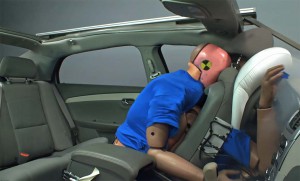
Transportation Sec. Elaine Chao was named in a lawsuit by two advocacy groups claiming federal safety officials failed to enforce a rear seat belt warning mandate.
Federal safety officials are being sued by two non-profit groups over the failure of the National Highway Traffic Safety Administration enforce legislation requiring a vehicle’s rear-seat occupants to be warned to buckle their seat belts.
The suit, filed by the Center for Auto Safety and Kids and Cars Inc., claims that the government has been too slow to implement the warnings, which were mandated in 2012 and supposed to take effect in 2015.
The mandate requires a “regular and salient reminder” (for example: an audible warning) about rear seat safety belts for passengers.
The two groups claim that nearly 1,000 people are killed annually in the rear seats of U.S. passenger vehicles because they do not buckle up. They suggest that proper belt usage lowers the risk of death by 44%.
(Not buckling up in back? You’re putting everyone in the car at risk. Click Herefor the story.)
“No one disagrees that seat belts save lives,” Jason Levine, executive director of the Center for Auto Safety, told Reuters. “We don’t think the lives of people in the back seat are worth less than those in the front.”
The lawsuit seeks to require NHTSA, part of the Department of Transportation, to start the rulemaking process immediately and have a rule in place within a year. Transportation Secretary Elaine Chao, who was also named as a defendant, issued no comment.
More than nine out of 10 Americans use their seatbelts when riding in the front of a car. But that number falls off sharply for rear seat passengers.
“The laws of physics aren’t suspended just because you’ve moved to the back seat,” said Jessica Jermakin, a senior IIHS researcher and author of a new study that found over 1,000 unrestrained back seat passengers were killed in crashes during 2015.
(Click Here to see more about the 1% decline in motor vehicle deaths in 2017.)
The IIHS asked Americans whether they buckle up in back and found that only 72% of 1,172 respondents said they did. Those aged 35 to 54 were lease likely to do so, the number coming in at only 66%. Among Millennials, those aged 18 to 34, 73% buckled up in back.
Most frequently, occupants say they don’t bother to buckle up on short trips, especially when riding in a cab or a ride-sharing vehicle. Only 54% of those using hired vehicles said they regular belted up in back.
The IIHS said one-fourth of the rear seat holdouts believed sitting in the back was safer. Smaller percentages said they did not use belts out of habit, because they forgot, or because they found belts uncomfortable or ill-fitting.
According to NHTSA, 35,092 people died in motor vehicle crashes in 2015 — the highest level in seven years, but 13,941 lives were saved by seat belts. NHTSA reports seat belts saved more than 343,000 lives from 1976 to 2015. It also suggests that seat belts would have saved another 368,000 lives had everyone worn them.
(New Senate HOT CARS bill aims to prevent children from being left behind. Click Here for the story.)
Motor vehicle deaths are down slightly – 1% – in the first half of 2017, according to the National Safety Council. New Hampshire is the only U.S. state that does not require adults to buckle up.

